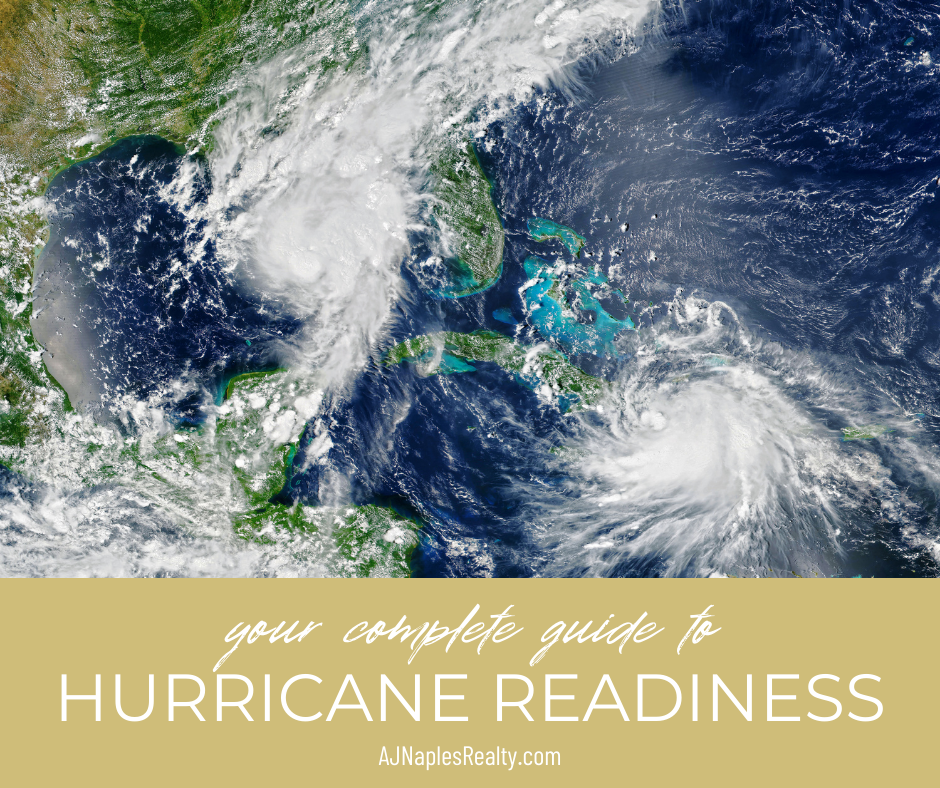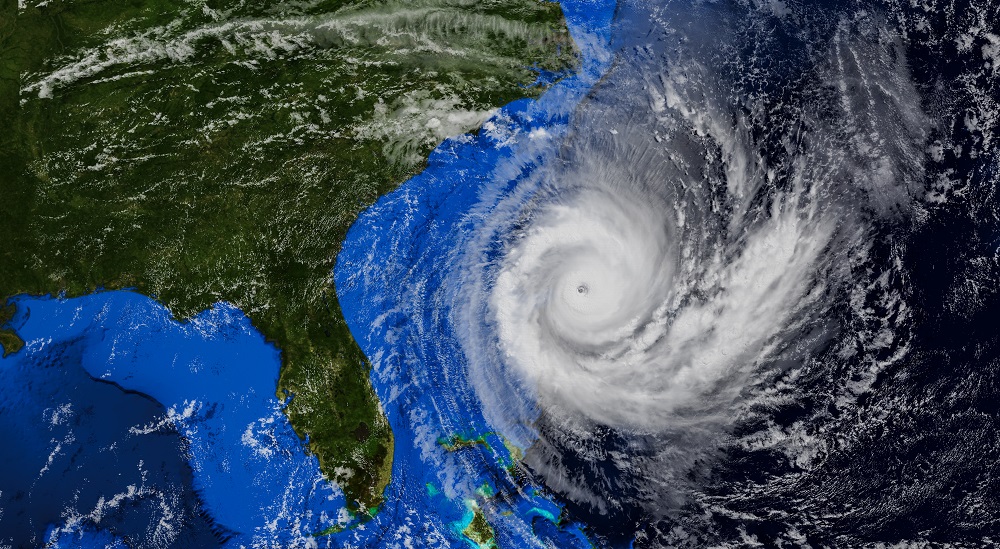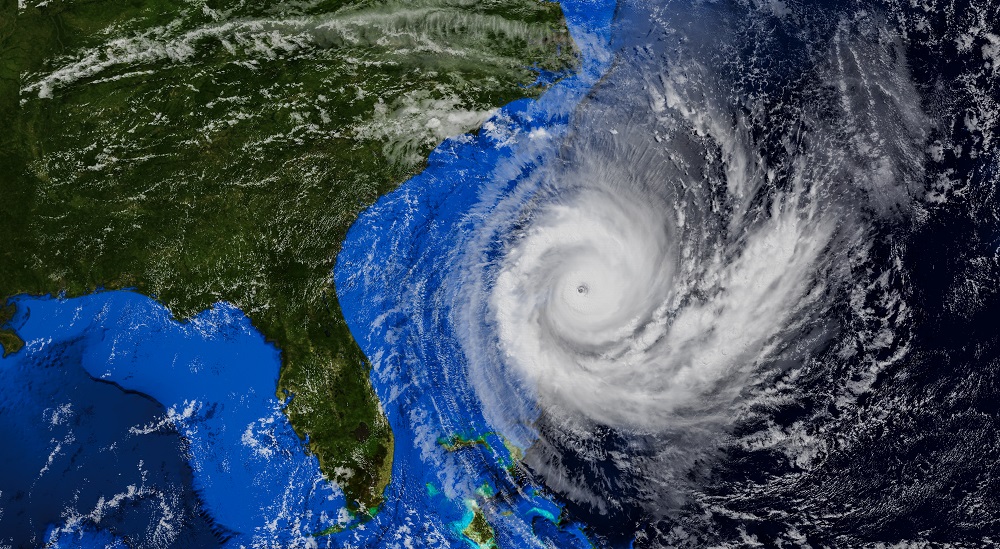If you’re buying a home for sale in Naples, or if you already live here, you know that hurricane season runs from the beginning of June through the end of November. But what can you do to keep yourself, your pets and your home safe? This guide explains.
Your Complete Guide to Hurricane Readiness
First things first: You have to be familiar with tropical storm and hurricane terms so you understand warnings. Here’s a quick run-down of the most common terms you’ll hear over the summer:
- Tropical storm: A tropical storm is a cyclone that has maximum sustained winds between 39 and 73 mph.
- Hurricane: A hurricane is a tropical cyclone with maximum sustained winds of 74 mph or higher.
- Watch: A watch is issued when hurricane or tropical storm conditions are possible in the specified area within 36 hours.
- Warning: A warning is issued when hurricane or tropical storm conditions are expected in the specified area within 24 hours.
- Tropical storm watch: A tropical storm watch is issued when tropical storm conditions are possible in the specified area within 48 hours.
- Tropical storm warning: A tropical storm warning is issued when tropical storm conditions are expected in the specified area within 36 hours.
- Hurricane watch: A hurricane watch is issued when hurricane conditions are possible in the specified area within 48 hours.
- Hurricane warning: A hurricane warning is issued when hurricane conditions are expected in the specified area within 36 hours.
- Eye of the storm: The eye of the storm is the calm center of a hurricane or tropical storm. It is surrounded by the storm’s eyewall, which contains the storm’s strongest winds.
- Rain bands: Rain bands are areas of thunderstorms that rotate around the center of a hurricane or tropical storm. They can produce heavy rain, strong winds and tornadoes.
- Storm surge: Storm surge is a rise in the ocean water level above the normal tide. It is often the most destructive and dangerous part of a hurricane or tropical storm.
Related: Find out how much your home is worth now!
Scroll down to learn more about how to prepare for hurricane season in Naples.
How to Prepare for Hurricane Season in Naples
Now that you know the terminology, it’s time to start preparing for hurricane season. Here are some tips:
- Know your evacuation zone
- Make an evacuation plan
- Stock up on supplies
- Prepare your home
- Stay informed
Here’s a closer look at each.
Hurricane Preparedness Tip #1. Know your evacuation zone.
The first step in preparing for hurricane season is to learn about shelter locations and evacuation routes in Collier County. The county government keeps updated maps here.
Hurricane Preparedness Tip #2: Make an evacuation plan.
After you know your hurricane evacuation routes, it’s time to make a plan. The American Red Cross recommends that you choose two meeting places: one close to home and one outside of your immediate area. That way, if you can’t get home, you’ll still be able to meet up with your family.
You should also practice your evacuation route so you know the fastest way to get to your meeting place. And make sure everyone in your family knows the plan.
Hurricane Preparedness Tip #3: Stock up on supplies.
Now it’s time to start gathering supplies. The Red Cross recommends that you have enough food, water and other supplies to last at least 72 hours. That may seem like a lot, but remember: Once a hurricane hits, it could be days before help arrives.
Some of the supplies you should have on hand include:
- Water: You’ll need one gallon per person, per day.
- Food: Non-perishable food that doesn’t require cooking, like canned goods, granola bars and peanut butter.
- First aid kit: Bandages, disinfectant, over-the-counter medications, etc.
- Flashlight and batteries: A flashlight for each person in your family. Make sure to get extra batteries, too.
- Portable chargers: For your cell phone and other devices.
- Clothing and bedding: A change of clothes for each person in your family, plus extra blankets and pillows.
- Toiletries: Toothpaste, toilet paper, soap and other important items.
- Important documents: Copies of your driver’s license, passport, birth certificate, insurance cards and other documents you may need.
- Cash: ATMs may not be working after a hurricane, so it’s always good to have cash on hand.
Hurricane Preparedness Tip #4: Prepare your home.
After you have your supplies, it’s time to start preparing your home. You may want to:
- Reinforce your garage door
- Cover all your windows with hurricane shutters or wood
- Trim trees and shrubs
- Secure outdoor furniture
- Board up windows
- Secure loose rain gutters and downspouts
- Clear your gutters
- Bring in outdoor furniture, trash cans and outdoor decor
- Make an emergency kit for your car
Hurricane Preparedness Tip #5: Stay informed.
The best way to stay safe during a hurricane is to stay informed. Keep track of the latest weather reports and alerts, and be sure to have multiple ways to get information, like a battery-operated radio, television or phone.
What Should You Do to Prepare Your Pets for Hurricane Season?
If you have pets, it’s important to make sure they’re prepared for hurricane season, too. Here are some tips:
- Make sure your pet is microchipped and has up-to-date ID tags. That way, if they get lost, you can be reunited more easily.
- Have a current photo of your pet on hand.
- Prepare an emergency kit for your pet, including items like food, water, a leash, a carrier and any medications they may need.
- If you’re evacuating, make sure to bring your pet with you. Many shelters do not allow pets, so it’s important to have a plan.
- If you can’t bring your pet with you, make arrangements with a friend or family member who can take them in.
What Should You Put in an Evacuation Kit for Hurricane Season in Naples?
Your emergency kit should have enough supplies for you and your family to last at least 72 hours. That includes:
- Water
- Food
- First aid kit
- Flashlight and batteries
- Portable chargers
- Clothing and bedding
- A battery-powered radio
- Medications and hygiene supplies
- Pet food and pet medications
How Can You Secure Your Home Against a Hurricane?
There are several things you can do to secure your home against a hurricane:
- Trim trees and shrubs. This will help prevent them from damaging your home in high winds.
- Secure outdoor furniture. Bring in patio furniture, grills and other items that could be blown around by the wind.
- Board up windows. Covering your windows with plywood or hurricane shutters will help protect them from debris.
- Secure loose rain gutters and downspouts. This will help prevent water from leaking into your home.
- Install a generator. If the power goes out, a generator can keep your lights and appliances working.
- Make an emergency kit for your car. In case you have to evacuate, it’s good to have a kit with food, water and other supplies in your car. (See the earlier section, “What Should You Put in an Evacuation Kit for Hurricane Season in Naples?” for instructions on putting together a kit like this.)
Are You Buying or Selling a Home in Naples?
Selling your home is a big deal, so you need to work with a REALTOR® who can get it right. We know how to market your home to all the right buyers, regardless of its price point. We’ll help you sell your home quickly and at the best possible price!
If you’re looking for a home for sale in Naples, we’re here to help. We specialize in luxury real estate and can show you any listing. In the meantime, please feel free to explore what’s available now:
- Pelican Bay homes for sale
- Homes for sale in 34102
- Homes for sale in gated communities in Naples
- Golf course homes for sale in Naples
- Aqualane Shores luxury homes for sale
- Old Naples homes for sale
- Homes for sale in Talis Park, Naples
- Park Shore (Naples) homes for sale
- Homes for sale in Moorings
- Condos for sale in Moorings
- Coquina Sands homes for sale
- Tiburon homes for sale
- Grey Oaks homes for sale
- Pine Ridge homes for sale
- Homes for sale in Pelican Marsh
You can also browse all Naples homes for sale.
FREE Home Valuation
Fill out the form below and we will send you a FREE NO OBLIGATION CMA on your home that includes your homes' true value in todays market, recent nearby sold comparisons, pending properties and more valuable market data.





